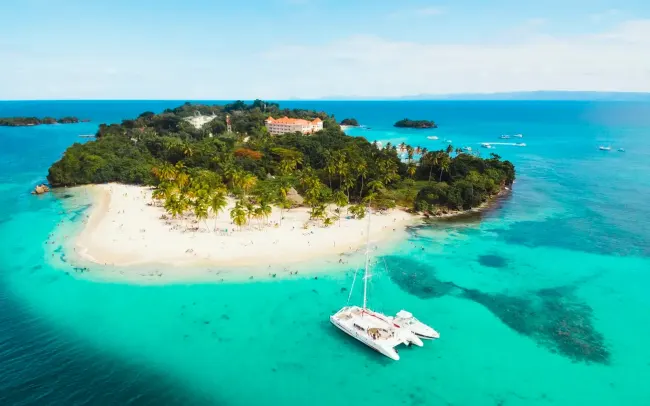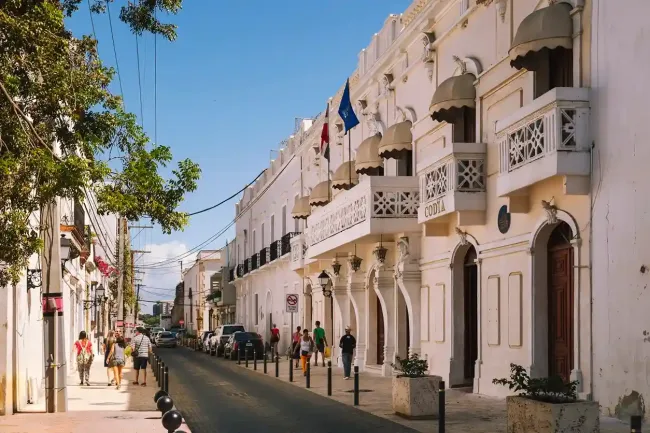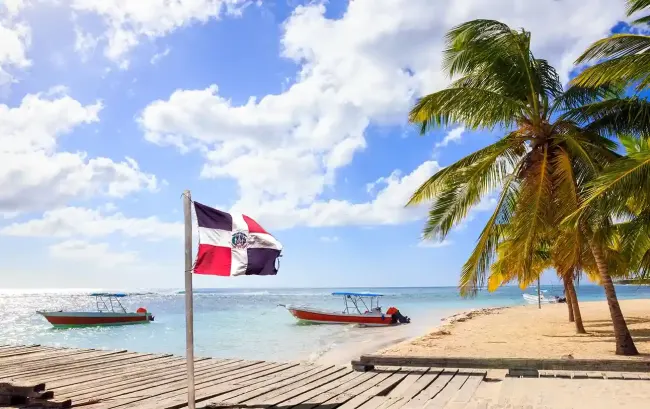
Dominican Republic
Welcome to Dominican Republic
Traveling to the Dominican Republic? You may need a visa – find out if you do, which type, and how to apply so you can get the paperwork out of the way and focus on your trip.

What’s a Dominican Republic eTicket and who’s it for?
Who’s the Dominican Republic eTicket for? Anyone who wants to enter or leave the Dominican Republic has to complete the registration for the eTicket, whether they’re a national or a visitor.
What’s the purpose of a Dominican Republic eTicket? It’s a document that combines a health declaration, customs form, and exit form in just one single document. Please note that it does not replace a visa.
Most visitors don’t need a visa for the Dominican Republic, but only need to pay a US$10 entry fee for a stay of up to 30 days and fill out the eTicket before leaving the country.
How long can you stay with a Dominican Republic eTicket?
The eTicket is a Single entry document, so you must apply for one each time you travel to the Dominican Republic.
What are the Dominican Republic long-term visa options?

The Dominican Republic offers several long-term visa options, such as employment, study, business, and residence. Here are some of the common long-term visas:
-
Work Visa: Ideal for professionals and entrepreneurs, the Work Visa is your key to a thriving career in the Dominican Republic, allowing you to immerse in its dynamic job market for one year.
-
Study Visa: Tailored for students and academics, the Study Visa opens doors to a world of knowledge and learning in the Dominican Republic, facilitating a year-long educational journey.
-
Investment Visa: Designed for investors and business minds, the Investment Visa offers a unique opportunity to contribute to and benefit from the Dominican Republic's growing economy for an entire year.
-
Retirement Visa: Perfect for retirees seeking a tranquil lifestyle, the Retirement Visa enables a serene year-long stay in the Dominican Republic, amidst its picturesque landscapes and warm culture.
-
Family Reunion Visa: Crafted for those longing to be close to loved ones, the Family Reunion Visa brings families together, offering a year-long embrace in the heart of the Dominican Republic.
At iVisa, we currently don’t offer these visas, but you can find out more from the nearest Dominican Republic Embassy or Consulate.
Staying healthy in the Dominican Republic: Here’s what you need to know
Health facilities in the Dominican Republic vary in quality, especially between public and private institutions. Here's what travelers should know.
Make sure to stay updated on routine vaccines
-
Keep updated with the Dominican Republic's COVID-19 requirements, such as quarantine, testing, or vaccine certificates, through your airline or the Dominican Republic government website.
-
Travelers are advised to be up-to-date with routine vaccinations.
-
The country has reported cases of dengue fever, cholera, and malaria, so taking precautions against mosquito bites is advised.
Medical facilities
-
Major cities and tourist areas like Punta Cana and the North Coast offer private hospitals and clinics that provide high-standard care.
-
Public medical facilities are often lacking in resources and may not have English-speaking staff.
-
Medical tourism is growing in the country, especially for procedures like plastic surgery and dental care, but standards can vary, and it's important to research and consult with healthcare providers before undergoing any procedures.

Health insurance
We’d always recommend taking out health insurance before you travel anywhere from any destination.
All the major cities in the Dominican Republic will have private medical care, but it’s expensive. You should choose travel insurance with high medical limits.
Contact your insurance provider before traveling to make sure you have the right level of coverage.
Other things to consider:
-
Trip cancellation, delay, and interruption benefits.
-
Medical expenses and medical evacuation benefits.
-
Baggage coverage.
Things to be aware of when visiting the Dominican Republic
Keep an extra eye on the following to keep healthy and safe during your trip to the Dominican Republic:
1. Traffic-related injuries: Traffic safety is a major concern, with the country having one of the highest rates of traffic deaths per capita globally, so be careful when driving a rental car or scooter.
2. Crime: The Dominican Republic has similar crime rates to major U.S. cities, with common issues involving robbery and pickpocketing. Serious assaults are less common but can occur.
3. Water and food safety: There have been reported cases of cholera in the country, so it's crucial to practice good hygiene and be cautious with food and water. Avoiding tap water and consuming bottled or treated water is advised.
Medication for personal use
Follow these tips to bring into the Dominican Republic some over-the-counter medicines:
-
Declare all medications: Report all medication for personal use to customs authorities.
-
Original packaging: Always keep medicines in their original containers and in transparent bags in your hand luggage.
-
Prescription or doctor's letter: Present the medical prescription issued by your doctor or other competent authority in English.
-
Check for restrictions: Call the Dominican Republic's embassy to verify that all of your prescription(s) are legal to bring with you.
-
Quantity aligned with itinerary: Bring only a reasonable quantity that aligns with the duration of your stay to avoid complications.

 Australia ETA Online
Australia ETA Online
 United Kingdom ETA
United Kingdom ETA
 India Tourist eVisa
India Tourist eVisa
 Canada ETA Visa
Canada ETA Visa
 Turkey eVisa
Turkey eVisa
 Egypt eVisa
Egypt eVisa
 Singapore SG Arrival Card
Singapore SG Arrival Card
 Indonesia eVoa Visa
Indonesia eVoa Visa
 Aruba ED Card
Aruba ED Card

